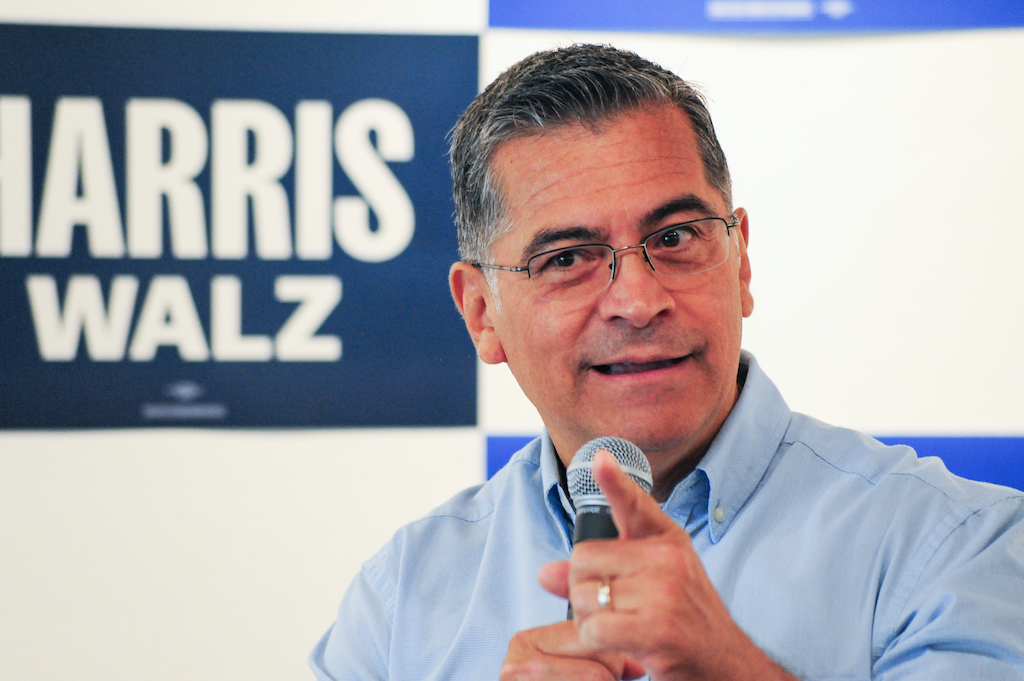(Phoenix, Arizona) — With the 2024 election approaching, a new generation of voters is preparing to leave its mark on American politics. Many of these young voters, especially junior college students, will be casting their ballots for the first time, adding momentum to an election that could define the nation’s political future.
Their growing influence was highlighted during a visit by U.S. Health and Human Services (HHS) Secretary Xavier Becerra in Phoenix on Saturday. Becerra addressed a small group of first-time voters, mostly junior college students, as part of the Harris-Walz campaign’s effort to energize young supporters backing Vice President Kamala Harris and Minnesota Governor Tim Walz for the 2024 Democratic ticket.
Related → 2024 United States elections: a nonpartisan guide for undecided voters
In a political climate marked by deep divisions and distrust in traditional institutions, young voters are now seen as a pivotal group. The pressing question is: how will this emerging voting bloc shape the election, and what issues are driving their choices?
Generational shifts in politics
Understanding the potential impact of these young voters requires examining the broader generational shifts in American politics. Each generation, shaped by its own unique experiences, tends to align with specific political values.
For example, Baby Boomers (born 1946-1964) historically lean conservative, driven by priorities such as economic stability and national security. Generation X (born 1965-1980), often skeptical of authority, leans more centrist, while Millennials (born 1981-1996) have embraced progressive values, especially on social issues like LGBTQ+ rights and climate change.
Generation Z (born after 1996), the newest voting cohort, has grown up in a digital-first world, shaped by social media, the climate crisis, and social movements like Black Lives Matter. Though leaning more leftward, many members of Gen Z are deeply critical of political institutions overall.
This generational shift in the electorate is particularly evident in the 2024 election. According to the Center for Information & Research on Civic Learning and Engagement (CIRCLE), 40.8 million Gen Z members, aged 18-27, will be eligible to vote in 2024, including 8.3 million who have aged into the electorate since the 2022 midterms.
These young voters, including the first-time voters Secretary Becerra spoke to in Phoenix, represent a powerful force that campaigns like Harris-Walz are working to mobilize, especially in key battleground states.
Lessons from 2020
The 2020 election offered key insights into the role of young voters. Youth turnout reached a historic 50%, according to CIRCLE, with many rallying behind progressive causes like economic justice and climate action. Their influence was particularly felt during the Democratic primaries, where young voters helped push the party leftward on issues like universal healthcare and free college, even though Bernie Sanders did not win the nomination.
Now in 2024, youth voters remain a focal point for campaigns seeking to channel that energy and enthusiasm into tangible electoral power.
The role of junior college students
Junior college students, in particular, are an often overlooked but crucial demographic. Community colleges enroll nearly 12 million students each year in the U.S., representing a diverse, working-class population facing unique challenges. Economic policies, especially those related to income inequality, healthcare, and student debt, resonate strongly with this group.
For many junior college students, voting in 2024 will be a chance to support candidates whose policies address these pressing concerns. Becerra’s visit to Phoenix underscored this point, as Democratic campaigns seek to engage these young, working-class voters who could prove decisive in the election.
🚀 HHS @SecBecerra energizes first-time voters and first-generation college students in #Phoenix, #Arizona, rallying support for @KamalaHarris & @Tim_Walz ahead of the #2024Election. 🗳️ 🇺🇸#UnitedStates @infusethenews pic.twitter.com/f4f5SpMdQU
— Barriozona Magazine (@barriozona) September 14, 2024
How young voters could shape 2024
Young voters, especially first-time voters, could play a significant role in swing states like Arizona, where the race is tight. While historically they have turned out in lower numbers than older voters, several factors suggest that 2024 could see record youth participation:
Social media mobilization: Platforms like TikTok and Instagram have become key arenas for political activism and discourse among Gen Z. In 2020, digital organizing was instrumental in driving youth voter turnout, a trend likely to continue in 2024 as candidates increasingly use these platforms to engage young voters.
Climate concerns: For many young voters, climate change is a top priority. A 2023 Gallup poll found that nearly half of Americans (46%) believe global warming will pose a serious threat within their lifetime. Young voters, in particular, are motivated by this issue, especially in states like Arizona and Florida, where environmental concerns are high.
Economic justice: The economic challenges facing young people—including student debt, wage stagnation, and inflation—are key issues that could drive youth turnout. Candidates who offer solutions to these problems are likely to capture the support of first-time voters.
The 2024 election: a defining moment
In 2024, young voters, especially those attending junior colleges, have the potential to shape the political landscape. Secretary Becerra’s rally in Phoenix highlights the significance of these voters to the Democratic strategy. Their turnout could make the difference in critical battleground states, influencing the direction of U.S. politics for years to come.
© 2024, Eduardo Barraza. All rights reserved.





